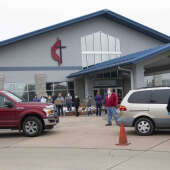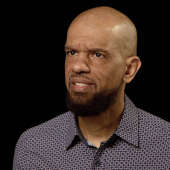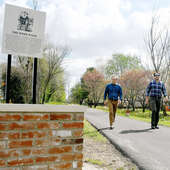The wild west of cryptocurrency market

On Christmas Day, one of the most recognizable sports venues in the United States changed its name.
The Staples Center in Los Angeles, opened in 1999 and now home to two National Basketball Association teams plus another in the National Hockey League, became crypto.com Arena.
Over the recent Thanksgiving holiday weekend, American viewers were treated to actor Matt Damon’s one-minute crypto.com commercial — an advertisement ending with words of an ancient Latin proverb: “Fortune favors the brave.”
What follows in this article is a cautious attempt to explain the cryptocurrency phenomenon through the experience of local bank executives, law enforcement personnel and those who have chosen to invest in this medium of exchange — which seemingly burst upon the world scene in 2009 as Bitcoin was created.
Readers should be advised that learning about cryptocurrency is akin to trying to drink water from a fire hose with nozzle wide open and gushing.
There is so much information, so much to absorb, that this writer makes no claim to expertise in wading into this subject matter.
The hope, therefore, is that the consumer of this article will see the shades opened on a mysterious world whose inhabitants are often passionate and who speak a language presently inaccessible to many.
Definitions
With that preface, what is crypto?
The word “crypto” comes the Greek word kruptos, meaning “hidden,” “concealed,” or “secret.”
The word “cryptocurrency” refers to a collection of binary data designed to work as a medium of exchange with individual coin ownership referring to something not tangibly held in a human hand but rather stored in a “ledger” — a computerized database using cryptography.
Ronald Rivest, a professor at the Massachusetts Institute of Technology (MIT), describes cryptography as “the practice and study of techniques for secure communication in the presence of adversarial behavior.” Rivest boils down his rather obtuse definition this way: “Constructing and analyzing protocols to prevent third parties or the public from reading private messages, to counterfeit or to double spend.”
Here is one more effort at a definition: Cryptocurrencies are systems allowing for secure payments online which are denominated in terms of virtual “tokens,” like Bitcoin.
Bitcoin — the first-ever cryptocurrency — and others which have followed in its wake, are created through a process known as mining, which is to say, the use of computers to solve problems. One estimate is there are at least 1,600 cryptocurrencies available with the number growing every day.
Benefits
The Iranian-born Kiana Danial, who refers to herself as “Invest Diva,” said with cryptocurrencies, it is possible to dispense with traditional banks altogether.
Cryptocurrencies, Danial says, “rely on a technology called blockchain, a decentralized (read: no single entity in charge) system to confirm transactions.”
Theory to action
If a person wanted to get started with cryptocurrency, fortunebuilders.com suggests the following process:
1. Join a Bitcoin exchange.
2. Get a Bitcoin wallet.
3. Connect the wallet to a bank account.
4. Place a Bitcoin order.
5. Manage a Bitcoin investment.
Local experience
Steve Green, senior vice president of Cape Girardeau’s First Missouri State Bank, has more than 30 years in the industry.
Green said he first invested in Bitcoin in 2017.
“I put a little money in, and my Bitcoin almost immediately went to zero (value) and stayed down for quite some time. I still have it and it’s come back, and I’ve done pretty well with it, but I put in so little that when the value went to almost zero, it wasn’t going to change my world. It was absolutely discretionary money I invested,” he said.
Grady Gamble, owner of GR (Golden Rule) Insurance Associates in Jackson, said he is selling his stake in the company largely in order to focus on crypto — and is starting a YouTube channel, available free of charge.
“I see a huge need to help others navigate through all the crypto mayhem,” he said.
Follow Gamble’s next words, if you can.
“I want my mom, for example, to be able to download a MetaMask wallet, connect it to the Binance smart chain, and then buy a particular gaming coin on a pancake swap. I want her to be able to create liquidity for that coin, stake the liquidity and farm it and make 200% interest,” he said.
Gamble admitted there is what he called a “volatility” to crypto.
“In 2016, I got more seriously into it and was even doing it fulltime after having made quite a lot. Then I made nearly every mistake humanly possible and lost all my money in crypto,” Gamble recalled.
“I thought back then Bitcoin, Ethereum and Binance coin would all go obsolete and other better coins would take over. Those were my three most owned coins and I sold just about all of them and bought a bunch of others that went to zero. I was invested in about 200 different coins and at least 100 either went to zero or became virtually worthless. After having lost all my money, I pretty much gave up on crypto in 2020. But the little bit that I still had of bitcoin, Ethereum and Binance turned out becoming a small fortune at the beginning of 2021 — and it got me back into the game.”
Andrew Bard, operator of a Cape Girardeau Airbnb and founder of EcoRide PH Electric Bike & Scooters, also used to teach crypto classes in Cape Girardeau and makes a prediction.
“I fully expect Bitcoin to become somewhere around the price of gold — about $450,000 a coin — sometime in the next three-to-five years, especially with the way inflation is going and people losing their faith in the dollar,” said Bard.
“Don’t let anyone tell you Bitcoin can’t be the global currency because it can,” he added, noting El Salvador in June passed a law making the Central American nation the first country in the world to accept Bitcoin as legal tender.
On Nov. 20, El Salvador President Nayib Bukele announced construction will begin in 2022 on “Bitcoin City,” a project to be funded by cryptocurrency with residential and commercial districts, restaurants and an airport to be built near the Conchaqua volcano.
Clint Karnes, market president for Wood & Huston Bank in Cape Girardeau and Jackson, said he is not personally invested in cryptocurrency.
“(Crypto) is a bit of a mystery. I know folks who have made quite a bit of money investing in it, and I don’t know anybody who’s lost money — but that’s certainly not a recommendation on my part,” said Karnes, who also suggested people to use discretionary funds if they want to invest in this nascent phenomenon.
“(Our bank) will take very much a wait-and-see approach about how (crypto) integrates into a more mainstream investment channel. I had a professor in college who used to say, ‘If you want to invest in commodities and you don’t have $10,000 to put in an ashtray to light on fire, then you shouldn’t do it.’”
Both Karnes and Green said the banking community is waiting on federal guidance about cryptocurrency.
“I think the Federal Reserve Board would dismiss (crypto) if there wasn’t technology in place that could give investors some sort of comfort level,” said Karnes.
“While I’m by no means making a recommendation, there’s a validity to cryptocurrency based on block chain tech that makes it worthy of at least being considered.”
Green said he expects banks to receive some regulatory direction in 2022, citing what is referred to as “crypto sprint,” a proposed roadmap to provide oversight for the booming cryptocurrency market.
Yahoo News said “crypto sprint” is a federal interagency plan by the Federal Reserve, the Federal Deposit Insurance Corporation (FDIC) and the Office of the Comptroller of the Currency (OCC) to give guidance about what activities by banks in crypto are legal and how financial players should comply with existing regulations on safety, soundness and consumer protection.
“What’s unique with this is we’re not dealing with a currency issue from a government entity. (Crypto) is a decentralized currency. Can it be used to collateralize loans, how should payments from crypto be processed and how do you identify the risk?” Green said.
Neither First Missouri State Bank nor Wood & Huston Bank, as community banks, will deal with cryptocurrency at the moment.
Larger banks, Green said, have seized the initiative, however.
“J.P. Morgan, a lot of large banks, have opened departments for crypto, so it’s not going away and will continue to grow.”
Law enforcement
Cape Girardeau Police Chief Wes Blair said he worked a lot of financial crime years ago when he was a detective — but that was long before the advent of cryptocurrency.
“I’ve never worked a crypto case, but anecdotally I’ve heard stories about it being used in relation to child pornography, sex trafficking and the purchasing of illegal narcotics,” he said.
“Since cryptocurrency came out, we in law enforcement have seen a lot of warnings coming from the federal government suggesting (crypto) could be a tool, or a mechanism, to trade currencies on the dark web for illicit services,” he added, noting if such a case were to develop locally, he would seek to hand off the investigation to the FBI or Homeland Security and perhaps the Secret Service.
Moreover, Blair said his Cape Girardeau department has not even gotten a call about cryptocurrency to-date.
Cape Girardeau County Sheriff Ruth Ann Dickerson said she expects police agencies to hear more about crypto in the relatively near future.
“I think you’re going to see a trend to get additional training to get more familiar with it so we can be prepared. Cryptocurrency is not recognized by a lot of the financial authorities that we’re used to, so I do have concerns about the future with crypto,” she said.
Caveat emptor
“There’s a bit of a feeling of buyer beware, of the Wild West West a little bit, because crypto has moved out of the margins and into the mainstream as an asset class with a lot of volatility,” said Green.































